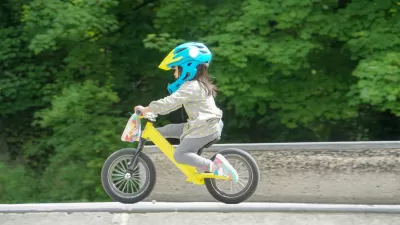CityLab asked readers in carless households with kids about how they get around and the challenges they face.

In a survey of readers, CityLab asked for details about what life with kids is like for a carless household:
For some of you, being carless with kids is a privilege. You have gone to great lengths to design your lives around your choice, including the accessible neighborhood where you chose to live. For others, of course, being carless is a financial necessity—or at least, in many cases, a cost-saving decision. And many of you helped us to expand our definition of "carless" to incorporate "car-light" families.
Some readers said they went multimodal, adding transit, ridesharing, carsharing, and biking to the mobility mix. Others said they had to find the right bike or stroller to meet their transportation needs. Several noted that their ability to go car-free depended on geography: in cities with good transit and biking infrastructure, not having a car was doable.
One reader in Porto Alegre, Brazil, just gave up on transit and bought a car. "After waiting more than an hour in the rain, Rachel finally caught a bus, then walked the final stretch home juggling Alex, both their bags, and an umbrella. She got in soaked and demoralized, and a serious reevaluation of our commitment to public transportation ensued."
FULL STORY: What It Takes for These City Parents to Live Car-Free

Planetizen Federal Action Tracker
A weekly monitor of how Trump’s orders and actions are impacting planners and planning in America.

Maui's Vacation Rental Debate Turns Ugly
Verbal attacks, misinformation campaigns and fistfights plague a high-stakes debate to convert thousands of vacation rentals into long-term housing.

San Francisco Suspends Traffic Calming Amidst Record Deaths
Citing “a challenging fiscal landscape,” the city will cease the program on the heels of 42 traffic deaths, including 24 pedestrians.

Amtrak Rolls Out New Orleans to Alabama “Mardi Gras” Train
The new service will operate morning and evening departures between Mobile and New Orleans.

The Subversive Car-Free Guide to Trump's Great American Road Trip
Car-free ways to access Chicagoland’s best tourist attractions.

San Antonio and Austin are Fusing Into one Massive Megaregion
The region spanning the two central Texas cities is growing fast, posing challenges for local infrastructure and water supplies.
Urban Design for Planners 1: Software Tools
This six-course series explores essential urban design concepts using open source software and equips planners with the tools they need to participate fully in the urban design process.
Planning for Universal Design
Learn the tools for implementing Universal Design in planning regulations.
Heyer Gruel & Associates PA
JM Goldson LLC
Custer County Colorado
City of Camden Redevelopment Agency
City of Astoria
Transportation Research & Education Center (TREC) at Portland State University
Jefferson Parish Government
Camden Redevelopment Agency
City of Claremont





























